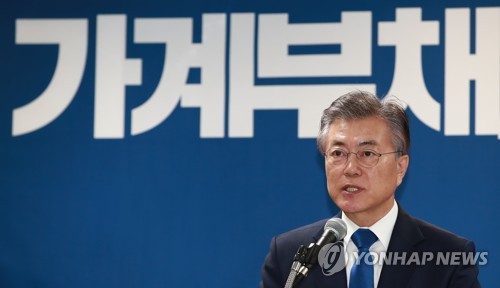South Korea's new Moon Jae-in government will push to introduce a cap on household debt to prevent it from rising further and thus straining Asia's fourth-largest economy, a chief adviser to the president said Monday.
The Moon administration will place restrictions on total household indebtedness, under which the ratio of household debt to disposable income should not exceed the 150 percent mark, said Kim Sang-jo, the chief architect of Moon's economic policy pledges.
"The new government will not allow interest rate cuts or eased property regulations to lead to a surge in household debt as the previous Park Geun-hye administration did, and will not try to boost the economy by invigorating the real estate market," said Kim, who teaches economics at Hansung University.
However, the envisioned cap will not serve as an absolute guideline for banks and other financial institutions, but a benchmark for the government's monetary and fiscal policies, he added.
The move comes as the ratio has been rising at a fast clip over the past few years. The figure soared to 151.1 percent at the end of September last year from 133.1 percent as of end-2012.
Kim, who laid the foundations for Moon's economic policy promises during the campaign for the May 9 election, is widely mentioned as the candidate to become Moon's chief economic adviser, the chief of the country's antitrust watchdog or the top financial regulator.

South Korea's household debt has been on the rise in recent years as people borrowed money from banks and other financial companies to buy homes, cover living costs and invest in real estate and businesses. The country's outstanding household credit -- which is composed of household loans and credit card spending -- came to 1,344 trillion won (US$1.19 trillion) at the end of 2016, up 11.7 percent from a year earlier.
The new administration is expected to engineer a soft landing for household debt through a proper mix of fiscal spending, monetary policy, restrictions on bank lending to households and other measures.
"While pushing for expansionary fiscal policy, the government will work with the Bank of Korea on interest rates and try to improve the quality of household debt by restricting bank lending," Kim said.
In a bid to stimulate the property market and thus the economy, the Park Geun-hye government softened the so-called loan-to-value (LTV) and debt-to-income (DTI) ratios in 2014 to allow home buyers to borrow up to 70 percent of their property value and 60 percent of their income for mortgage payments.
The easing of the home loan regulations, however, has been under fire for failing to help give a fillip to to the economy and instead sharply increasing household debt.
But the new government may be cautious to lower the LTV and DTI ratios, which could put the real estate market into a funk, market watchers said. (Yonhap)


